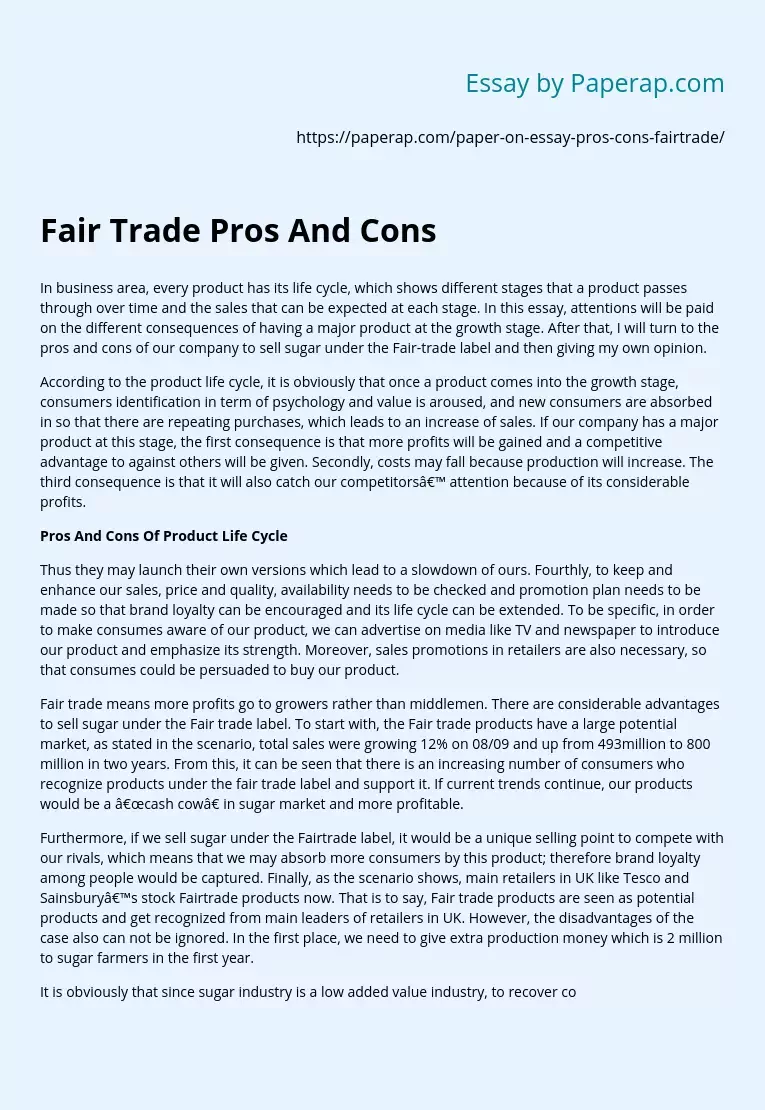Fair Trade Pros And Cons
In the business area, every product has its life cycle, which shows different stages that a product passes through over time and the sales that can be expected at each stage. In this essay, attention will be paid to the different consequences of having a major product at the growth stage. After that, I will turn to the pros and cons of our company to sell sugar under the Fair-trade label and then give my own opinion.
According to the product life cycle, it is obvious that once a product comes into the growth stage, consumers’ identification in terms of psychology and value is aroused, and new consumers are absorbed in so that there are repeating purchases, which leads to an increase of sales.
If our company has a major product at this stage, the first consequence is that more profits will be gained and a competitive advantage to against others will be given. Secondly, costs may fall because production will increase.
The third consequence is that it will also catch our competitors’ attention because of its considerable profits.
Pros And Cons Of Product Life Cycle
Thus they may launch their own versions which lead to a slowdown of ours. Fourthly, to keep and enhance our sales, price and quality, availability needs to be checked and a promotion plan needs to be made so that brand loyalty can be encouraged and its life cycle can be extended. To be specific, in order to make consumers aware of our product, we can advertise on media like TV and newspaper to introduce our product and emphasize its strength.
Moreover, sales promotions in retailers are also necessary, so that consumers could be persuaded to buy our product.
Fairtrade means more profits go to growers rather than middlemen. There are considerable advantages to selling sugar under the Fairtrade label. To start with, the Fairtrade products have a large potential market, as stated in the scenario, total sales were growing 12% on 08/09 and up from a 493million to 800 million in two years. From this, it can be seen that there is an increasing number of consumers who recognize products under the fair trade label and support it. If current trends continue, our products would be a “cash cow” in the sugar market and more profitable.
Furthermore, if we sell sugar under the Fairtrade label, it would be a unique selling point to compete with our rivals, which means that we may absorb more consumers by this product; therefore brand loyalty among people would be captured. Finally, as the scenario shows, main retailers in UK like Tesco and Sainsbury’s stock Fairtrade products now. That is to say, Fairtrade products are seen as potential products and get recognized by main leaders of retailers in UK. However, the disadvantages of the case also can not be ignored. In the first place, we need to give extra production money which is 2 million to sugar farmers in the first year.
It is obvious that since the sugar industry is a low added value industry, recovering costs and making profits will take a long term, therefore it would become a risky decision for our company. What is more, due to the high risk and low added value of sugar under the Fairtrade label, it might be a niche market, and according to the size of our company, it is too small to bother with. So the result of our efforts on Fairtrade products might not be paid back equally, and more seriously, it might even become a “problem child” in this environment.
In conclusion, both pros and cons of launching a product of sugar under the Fairtrade label should be taken into consideration. On the one hand, as our company is a 3. 6billion turnover company of producing sugar, we are experienced but also need to follow the current trend and seize every opportunity. Products under Fair trade are gradually recognized by an increasing number of people recently and sugar products are not an exception. From this point, these products are potential and selling them can enhance our brand loyalty to meet the needs of a certain group of customers.
On the other hand, since Fair-trade products are still in a growing stage, it might be products with a niche market and it is highly risky to do. In addition, if we only sell one product under the Fairtrade label but not all of them, we might be asked by customers that whether we are lying and then our brand loyalty would go down, even might be heavily criticized by media. However, because our company has a big influence on society, we could convert the market from niche to mainstream by launching various kinds of products and advertising or promotion. To do this, we can both enhance our brand loyalty and decrease the risk.
Fair Trade Pros And Cons. (2019, Dec 05). Retrieved from https://paperap.com/paper-on-essay-pros-cons-fairtrade/

